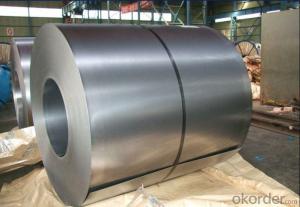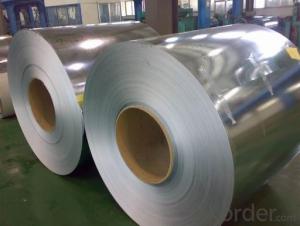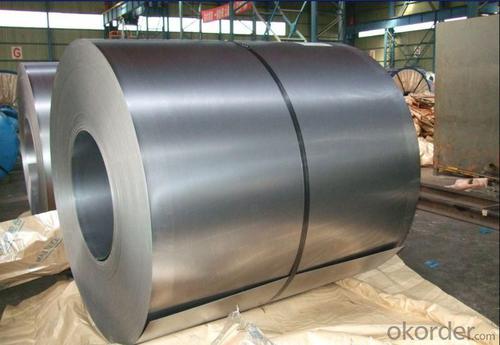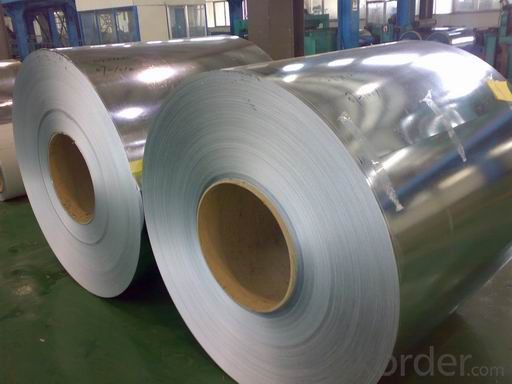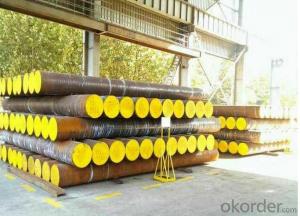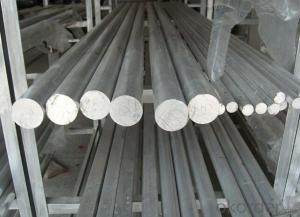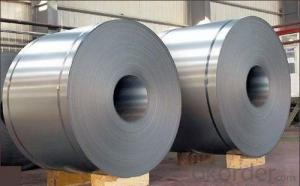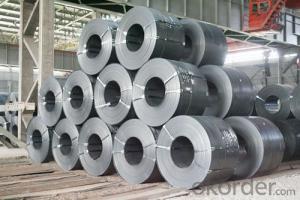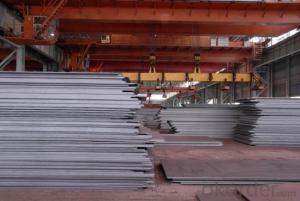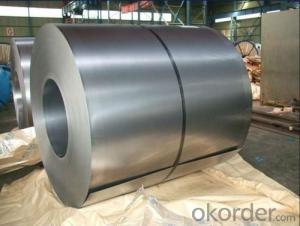Grade Q450NQR1 Corten Steel Coil 2.5*1250*C
- Loading Port:
- Shanghai
- Payment Terms:
- TT or LC
- Min Order Qty:
- 100 m.t
- Supply Capability:
- 20000 m.t/month
OKorder Service Pledge
OKorder Financial Service
You Might Also Like
Grade Q450NQR1 Corten Steel Coil 2.5*1250*C
Description:
-Grade: 09CuPCrNi-A
-Specification: 2.5*1250 in coil
Chemical Composition(%) of Grade Q450NQR1 Corten Steel Coil 2.5*1250*C:
| C | Si | Mn | P | S | Cu | Ti/V | Cr | Ni | RE |
| ≤0.12 | 0.25~0.75 | 0.20~0.50 | 0.060~0.12 | ≤0.020 | 0.25~0.50 | / | 0.30~1.25 | 0.12~0.65 | / |
Mechanical Properties of Grade Q450NQR1 Corten Steel Coil 2.5*1250*C:
| Thickness(mm) | Y.S(MPa) | T.S(MPa) | EL. A5% | Bend 180o | Impact Test | |
| oC | AKV J | |||||
| 2.0~≤6.0 | ≥345 | ≥480 | ≥24 | d=a | Normal/-40 | ≥47/≥21 |
| >6.0~12.0 | d=2a | |||||
Application of Grade Q450NQR1 Corten Steel Coil 2.5*1250*C:
Used in different weather. It has good anti rust protection and welding ability and is used in shipping container,support frame of outside building etc. Remarkably enhances the anti-corrosive performance of the structural element, lengthens the structural element service life, uses in manufacturing each kind of structural element which was used under the atmospheric envirenment and the caustic gas, the liquid envirenment.
Payment:
-Invoicing on theoretical weight or actual weight as customer’s request.
-FOB, CFR or CIF.
-Regular terms of payment:
1, 30% payment in advance, the remaining balance (70% payment) against the copy of B/L.
2, 30% payment in advance, the remaining balance (70% L/C) against the copy of B/L.
3, Negotiable.
-The payment terms will be written in contraction detailedly.
FAQ:
Q1: Why buy Materials & Equipment from OKorder.com?
A1: All products offered byOKorder.com are carefully selected from China's most reliable manufacturing enterprises. Through its ISO certifications, OKorder.com adheres to the highest standards and a commitment to supply chain safety and customer satisfaction.
Q2: How do we guarantee the quality of our products?
A2: We have established an advanced quality management system which conducts strict quality tests at every step, from raw materials to the final product. At the same time, we provide extensive follow-up service assurances as required.
Q3: How soon can we receive the product after purchase?
A3: Within three days of placing an order, we will arrange production. The shipping date is dependent upon the quatity, how many sizes you want and the plan of production, but is typically 1 month to 2 month days from the beginning of production.
Images of Grade Q450NQR1 Corten Steel Coil 2.5*1250*C:
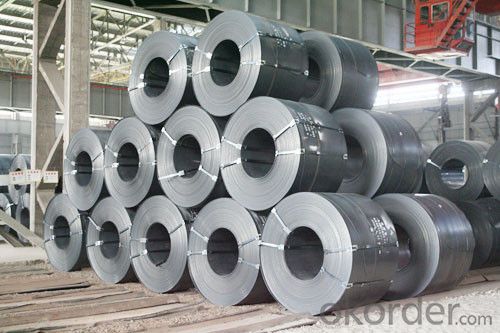
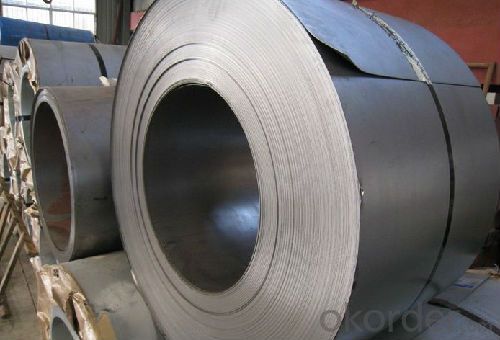
*If you would like to get our price, please inform us the size, standard/material and quantity. Thank you very much for your attention.
- Q: How does special steel perform in terms of creep resistance?
- Special steel performs exceptionally well in terms of creep resistance. It has been specifically engineered to withstand high temperatures and prolonged stress, making it highly resistant to deformation over time. This allows special steel to maintain its structural integrity and dimensional stability, making it an ideal choice for applications that require long-term durability under extreme conditions.
- Q: What is the purpose of annealing in special steel production?
- The purpose of annealing in special steel production is to improve the steel's mechanical properties and reduce its internal stresses. This process involves heating the steel to a specific temperature and holding it at that temperature for a certain period of time, followed by controlled cooling. Annealing helps to enhance the steel's ductility, toughness, and machinability, making it easier to work with and ensuring consistent and reliable performance in various applications.
- Q: How does the availability of raw materials affect the production of special steel?
- The production of special steel heavily relies on the accessibility of raw materials. Special steel, renowned for its outstanding strength, durability, and corrosion resistance, is widely used in industries like automotive, aerospace, and energy. The availability of raw materials, including iron ore, coal, chromium, nickel, and molybdenum, directly affects the production of special steel. These materials are crucial for the composition and characteristics of the steel. Any disruptions in their supply can significantly impact the production process. If the availability of iron ore, which is the primary source of iron, becomes limited or expensive, it can result in a scarcity of the main ingredient for steel production. Consequently, the production of special steel may decrease, leading to higher prices and potential shortages in the market. Similarly, the availability and cost of alloying elements play a vital role. These elements enhance the properties of steel, making it suitable for specific applications. For instance, chromium improves corrosion resistance, while molybdenum enhances strength at high temperatures. If these alloying elements are not readily available, it may hinder the ability to produce special steel with the desired properties. Moreover, the availability of energy resources like coal or natural gas is crucial for special steel production. These resources are used in the steelmaking process, particularly in the production of coke, which is essential for smelting iron ore. Limited availability or increased prices of energy resources can impact the cost and efficiency of steel production. In conclusion, the availability of raw materials plays a vital role in the production of special steel. Any disruptions or limitations in the supply of raw materials, including iron ore, alloying elements, and energy resources, can have a significant impact on the production process. This can result in higher prices, potential shortages, and compromised properties of the final product. Thus, ensuring a stable and sufficient supply of raw materials is crucial for the production of high-quality special steel.
- Q: How does special steel contribute to the oil and gas machinery industry?
- Special steel plays a crucial role in the oil and gas machinery industry by offering a range of properties and characteristics that are essential for the demanding and harsh operating conditions in this sector. Firstly, special steel is known for its exceptional strength and durability, enabling it to withstand the extreme forces and pressures involved in oil and gas extraction, transportation, and refining processes. This ensures that the machinery can operate reliably and efficiently, minimizing downtime and maintenance costs. Moreover, special steel possesses excellent corrosion resistance, which is vital in an industry where equipment is constantly exposed to corrosive environments, such as seawater, acidic gases, and high-temperature fluids. By using corrosion-resistant special steel, manufacturers can increase the lifespan of their machinery, reduce the risk of equipment failure, and enhance the overall safety of operations. Another key advantage of special steel in the oil and gas machinery industry is its high temperature resistance. Equipment used in this industry often operates at extremely high temperatures, particularly in processes like drilling, refining, and petrochemical production. Special steel alloys can withstand these elevated temperatures without losing their structural integrity, ensuring the safe and efficient functioning of the machinery. Furthermore, special steel offers excellent wear and abrasion resistance properties, making it ideal for components that are exposed to constant friction, such as valves, pumps, and drilling tools. This resistance to wear and abrasion helps to prolong the lifespan of these components, reduce maintenance requirements, and enhance the overall efficiency of the machinery. Overall, special steel contributes significantly to the oil and gas machinery industry by providing the necessary strength, durability, corrosion resistance, high temperature resistance, and wear resistance required for the demanding operating conditions in this sector. By utilizing special steel alloys, manufacturers can create robust and reliable machinery that can withstand the challenges of the oil and gas industry and help ensure the smooth and safe extraction, transportation, and processing of oil and gas resources.
- Q: How does special steel perform in abrasive wear conditions?
- Special steel is specifically designed to perform exceptionally well in abrasive wear conditions. Its unique composition and manufacturing process make it highly resistant to the detrimental effects of abrasion. The presence of alloying elements such as chromium, manganese, and molybdenum in special steel significantly enhances its hardness and toughness. These elements help to form carbides within the steel matrix, which act as barriers against abrasion. The carbides effectively resist the forces exerted by abrasive particles, preventing them from causing significant damage to the steel surface. Furthermore, special steel undergoes specialized heat treatment processes such as quenching and tempering, which further enhance its resistance to abrasive wear. These processes not only increase the hardness of the steel but also improve its overall toughness and durability. As a result, special steel is capable of withstanding high levels of abrasion without experiencing significant wear or deterioration. In addition to its exceptional mechanical properties, special steel also exhibits excellent corrosion resistance. This is achieved through the addition of elements such as chromium, which forms a protective oxide layer on the steel surface. This oxide layer acts as a barrier, preventing corrosive substances from reaching the underlying steel and causing further damage. Overall, special steel performs exceptionally well in abrasive wear conditions. Its unique composition, heat treatment processes, and corrosion resistance properties make it an ideal material for applications where abrasion is a major concern. Whether in mining, manufacturing, or other industries where abrasive wear is prevalent, special steel can provide superior performance and extended lifespan, ensuring optimal efficiency and cost-effectiveness.
- Q: How does special steel perform in extreme weather conditions?
- Special steel is specifically designed to have enhanced performance in extreme weather conditions. It exhibits exceptional strength, durability, and resistance to corrosion, making it highly suitable for withstanding harsh environments such as extreme heat, cold, humidity, and strong winds. Additionally, special steel maintains its mechanical properties and structural integrity even under extreme temperature variations, ensuring its reliability and longevity in adverse weather conditions.
- Q: What are the challenges in forging special steel?
- Forging special steel poses several challenges, primarily due to its composition and properties. One challenge is achieving the desired microstructure and alloy distribution throughout the steel during the forging process. Special steels often contain complex alloys, which can be difficult to evenly distribute and maintain during forging. Another challenge is controlling the temperature and heat treatment processes to avoid any detrimental effects on the steel's mechanical properties. Special steels are sensitive to temperature changes, and improper heating or cooling can lead to structural weaknesses or loss of desired properties. Additionally, forging special steels may require specialized equipment and techniques to accommodate their unique characteristics, making the process more intricate and demanding.
- Q: What are the different methods of machining special steel?
- There are several different methods of machining special steel, each with its own advantages and applications. Some of the most common methods include: 1. Turning: Turning is a machining process that involves rotating a workpiece while a cutting tool removes material from the surface. This method is typically used to create cylindrical shapes and can produce high-quality finishes. 2. Milling: Milling is a versatile machining method that uses rotary cutters to remove material from a workpiece. It can be used to create complex shapes and contours, and is often employed in the production of special steel components. 3. Drilling: Drilling is a machining process that involves creating holes in a workpiece using a rotating cutting tool. It can be used to create both through holes and blind holes in special steel, and is commonly used in various industries. 4. Grinding: Grinding is a precision machining method that uses an abrasive wheel to remove material from a workpiece's surface. It is often used to achieve tight tolerances and smooth finishes on special steel components. 5. Broaching: Broaching is a machining process that uses a sharp cutting tool with multiple teeth to remove material in a series of linear cuts. It is commonly used to create keyways, splines, and other intricate shapes in special steel. 6. Electrical Discharge Machining (EDM): EDM is a non-traditional machining method that uses electrical discharges to remove material from a workpiece. It is particularly useful for machining special steel with complex shapes or for creating small features. 7. Laser Cutting: Laser cutting utilizes a high-powered laser to cut through special steel with extreme precision. It is commonly used for intricate designs and can produce smooth edges without the need for subsequent processing. Each of these methods has its own advantages and limitations, and the choice of machining method depends on factors such as the desired outcome, the complexity of the part, and the properties of the special steel being machined.
- Q: What are the main factors affecting the fatigue strength of special steel?
- The fatigue strength of special steel is influenced by several main factors: 1. Material composition: The chemical composition of special steel plays a significant role in determining its fatigue strength. Alloying elements such as carbon, chromium, molybdenum, and nickel can enhance the material's resistance to fatigue by improving its ability to withstand cyclic loading. 2. Microstructure: The microstructure of special steel, including the grain size, crystallographic texture, and presence of any precipitates or phases, can significantly affect its fatigue strength. Fine-grained structures generally exhibit higher fatigue strength due to reduced stress concentrations and improved resistance to crack initiation and propagation. 3. Surface condition: The surface finish and integrity of special steel can have a significant impact on its fatigue strength. Surface defects, such as scratches, notches, or roughness, can act as stress concentrators and initiate fatigue cracks. Proper surface treatments, such as grinding or shot peening, can improve the fatigue resistance by reducing stress concentrations and introducing compressive residual stresses. 4. Heat treatment: The heat treatment process used to modify the structure and properties of special steel can also affect its fatigue strength. Proper heat treatment techniques, such as quenching and tempering, can optimize the material's microstructure, improve its hardness, and enhance its resistance to fatigue. 5. Loading conditions: The type and magnitude of cyclic loading applied to special steel significantly influence its fatigue strength. Factors such as stress amplitude, mean stress, load ratio (ratio of minimum to maximum stress), and frequency of loading can all impact the fatigue life of the material. 6. Environmental conditions: The presence of corrosive environments, high temperatures, or other harsh conditions can decrease the fatigue strength of special steel. Environmental factors can accelerate crack initiation and propagation, leading to reduced fatigue life. Proper selection of corrosion-resistant alloys or protective coatings can mitigate the adverse effects of the environment on fatigue strength. By considering and optimizing these factors, manufacturers and engineers can enhance the fatigue strength of special steel, ensuring its reliability and longevity in various applications.
- Q: How does special steel contribute to the manufacturing of springs for automotive applications?
- The unique properties and characteristics of special steel play a crucial role in the manufacturing of springs for automotive applications. Springs are essential components in automobiles as they provide suspension and shock absorption, which ensures a comfortable and smooth ride. One of the main advantages of using special steel in spring manufacturing is its high strength and durability. Springs are constantly subjected to stress and repetitive loading, but special steel can withstand these forces without deforming or breaking due to its exceptional strength. This property ensures that the springs can maintain their shape and performance over extended periods of use, guaranteeing reliable functionality. Special steel also offers excellent fatigue resistance, a vital characteristic for automotive springs. Fatigue occurs when a material weakens and eventually fails after repeated loading and unloading cycles. However, special steel is specifically designed to withstand fatigue, allowing the springs to endure constant pressure and stress without prematurely failing. Furthermore, special steel provides superior corrosion resistance, which is particularly important for automotive springs. Cars are exposed to various environmental elements, such as moisture, road salt, and chemicals, which can lead to corrosion and deterioration of the springs. By utilizing special steel with enhanced corrosion resistance, manufacturers can ensure that the springs have a longer lifespan and maintain their performance even in harsh conditions. Additionally, special steel offers versatility in terms of its composition and properties. Manufacturers can choose from a wide range of special steel alloys, each with its own unique characteristics, to meet specific requirements. This flexibility in material selection empowers manufacturers to design and produce springs that are tailored to the specific needs of automotive applications. Some alloys offer greater elasticity, allowing the springs to flex and absorb shocks more effectively, while others provide higher hardness, enhancing the springs' load-bearing capacity. In conclusion, special steel significantly contributes to the manufacturing of springs for automotive applications by providing high strength, durability, fatigue resistance, corrosion resistance, and versatility. These properties enable the production of reliable, long-lasting springs that ensure optimal suspension, shock absorption, and overall performance in vehicles.
Send your message to us
Grade Q450NQR1 Corten Steel Coil 2.5*1250*C
- Loading Port:
- Shanghai
- Payment Terms:
- TT or LC
- Min Order Qty:
- 100 m.t
- Supply Capability:
- 20000 m.t/month
OKorder Service Pledge
OKorder Financial Service
Similar products
Hot products
Hot Searches
Related keywords
